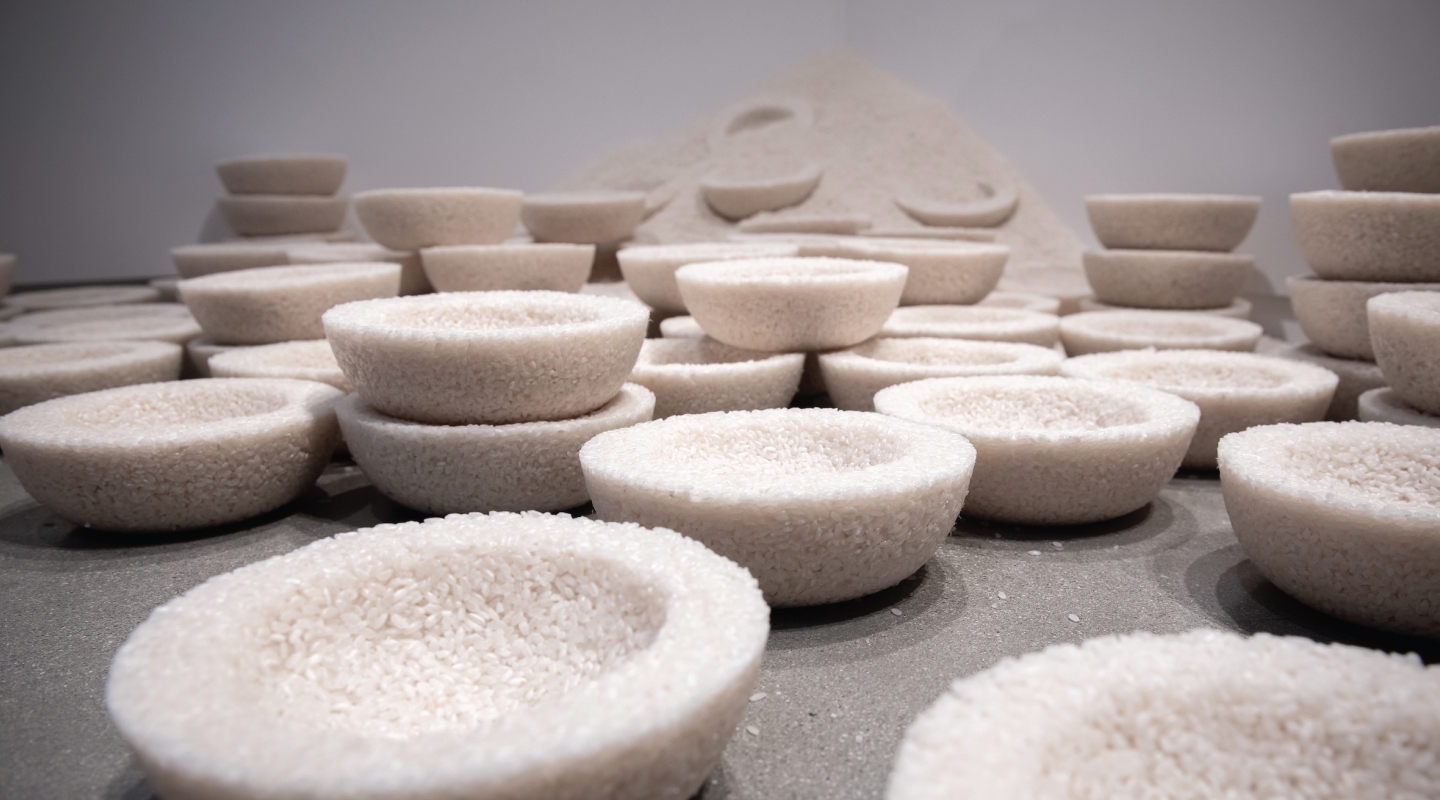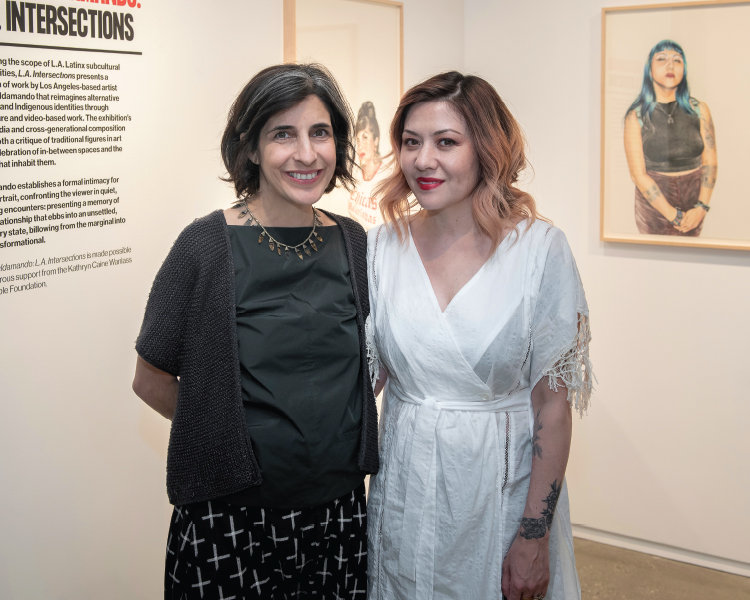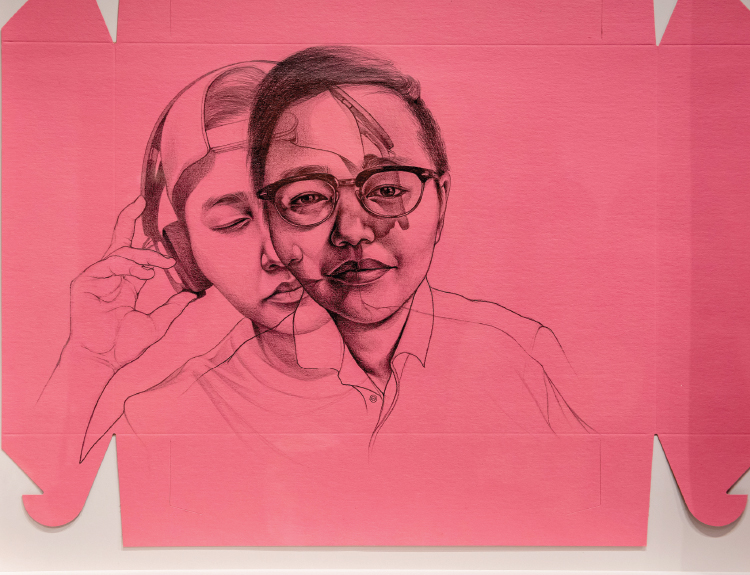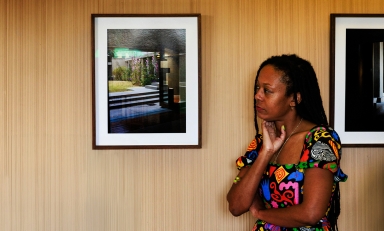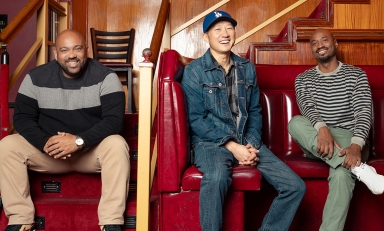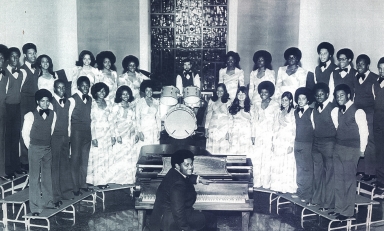With a rich menu of contemporary programming, the College’s Oxy Arts initiative nourishes socially conscious dialogue between the campus and community
When San Cha walked into the packed Oxy Arts gallery on York Boulevard for the Feb. 6 opening of artist Shizu Saldamando’s new solo show, her face lit up with the glow of recognition.
“There’s Maria—and Tiff and Kathi!” the Highland Park musician said, pointing to two of Saldamando’s compelling portraits of Angelenos displayed on the gallery wall. “This is my first time at Oxy Arts. It’s exciting to see brown faces up on York and to see people I know.”Five years in the making, Oxy Arts was conceived as a community-facing arts hub to appeal to neighbors like Cha. Her presence and that of other community members in the multiracial, multigenerational crowd of students, faculty, artists, and residents at the opening suggests that the College’s storefront approach to community engagement through the arts might be succeeding.
“Oxy Arts is defining a new way to program and curate a public arts space,” says director Meldia Yesayan in her office in the Oxy Arts building, a modest one-story 1920s commercial structure at the corner of Armadale Avenue and York, just one block south of campus. “This is a space where you can provide cultural community-based resources as well as showing world-class artists. It’s a space not just for exhibits and performances but for public use. By listening and partnering with community, we want to create meaningful encounters for and between the campus and the residents of Northeast Los Angeles.”
Inviting the Northeast L.A. community to participate in developing programming “is a very holistic, multifaceted, almost kaleidoscopic way to envision community engagement,” says Amy Lyford, professor and chair of art and art history and one of the co-authors of the original 2015 faculty proposal for the space. “It reflects an approach to art not only as a practice essential to a liberal arts education but as a strategy to maintain the vitality and identity of a community. In many ways it mirrors the vibrancy and diversity of L.A.’s artistic culture.”
Saldamando’s show is just the latest programming in the Oxy Arts space since it opened its doors last May. (Two spaces on the west side of the completely renovated 5,400-square-foot building will be home to locally owned eateries expected to open later this year.) Last summer, Los Angeles’ historic Bob Baker Marionette Theater was in residence, with free weekly puppet shows and workshops for every age group. The gallery featured Compass Rose, an exhibition based on a collaboration between Oxy Arts, Oxy’s Institute for the Study of Los Angeles, and Highland Park artist Debra Scacco.The personal stories of Highland Park residents, shared with Oxy students as part of an ongoing NELA Stories oral history program, were at the heart of Scacco’s Compass Rose, which reinterpreted historic Sanborn fire insurance maps of the area. “I thought that was a great idea,” says Kathy Gallegos, who founded Highland Park’s nonprofit Avenue 50 Studio more than 20 years ago to feature Chicano art. “It was a way to find out about the community, bring those stories alive, and give honor to the people who live here and their history.”
Fall brought Breaking Bread in L.A., an exploration of how food offers the possibility of cross-cultural connections, with a group exhibition, performances, film, lectures, panel discussions, and—of course—food. The idea behind it was a simple one: “In a time of deep social divisions, to find a sense of belonging and connection through the unique legacies and culinary traditions of our multicultural communities,” says Yesayan. Twice a week, community members are invited to drop in, have a cup of coffee, and browse a selection of books from the College’s library.
“Oxy Arts was designed as a space for people to engage, to think about as their own,” Lyford says. “The goal is to be open and welcoming, which is reflected in the architecture. Our storefront approach is more about people walking by and saying, ‘What’s that?’ and being welcomed into the space.”
Stephanie Maynetto-Jackson, a Highland Park native and current president of the Historic Highland Park Neighborhood Council, likes what she’s seen so far. “It’s an amazing program,” she says. “They want everyone to feel welcome in that art space. It’s nice to have a safe space to go to. It’s not an intimidating space to get into.”
In addition to its collaborative, community-based approach, another factor that sets Oxy Arts apart is the Wanlass Artist in Residence program. Funded by the Kathryn Caine Wanlass Charitable Foundation, the program makes it possible to bring in acclaimed local artists like Saldamando, named by ARTnews as “One of 15 Los Angeles Artists to Watch” last year, to teach and work with students.
Launched in 2013, the Wanlass program has brought major artists such as Candice Lin, Kenyatta A.C. Hinkle, and Rafa Esparza to campus, “artists who are L.A.-based, on the cusp of their careers exploding, who are being invited to the Whitney Biennial and being written about in The New York Times,” Lyford says. It’s also evidence of the growing national prominence of L.A. artists, she adds—what The New York Times earlier this year called “America’s most exciting scene.”
“It’s an incredible legacy to be a part of,” says Saldamando, a San Francisco native and UCLA graduate who lives in East Los Angeles. “There’s really nothing else like it. They pay you to teach, put on an exhibition, and put together a catalog. I have taught at other places where it’s kind of been sink or swim, but at Oxy I went to teacher orientation and they hooked me up with other professors. The students are really amazing, super smart. I’ve gushed about how amazing this residency is. … I have a feeling it’s going to grow.”
A new five-year, $1 million grant from the Mellon Foundation will make it possible for Oxy Arts to widen its network of community partners in Northeast L.A. and expand its arts education programs through a series of collaborations with local arts organizations, educators, teaching artists, and the Los Angeles Unified School District. Focused on underserved public school students, the arts education initiative will involve Oxy students in providing a wide range of opportunities, from visual art and dance workshops to theater, that develop creative solutions for the daily struggles facing their neighborhoods.
Oxy students are already active through ColLABorate, a series of after-school arts education workshops for sixth-, seventh-, and eighth-graders from local schools. This spring, students are working with lead teaching artist Patricia Yossen to develop original visual art, performance, and creative writing curricula based on their individual skills and interests.
Oxy Arts also provides studio art, theater, and music majors with a sophisticated public space to present their senior comps. In December, 10 graduating studio art majors presented the multimedia Syndicate: A Comprehensive Exhibition. “For the first time comps is in an actual public gallery, where it’s accessible to everyone,” says August Barringer ’20 of Norwalk, Conn., whose monumental vermilion sculpture Effulgence became the symbol of the show. Theater and music comps are scheduled for later this spring.
The centerpiece of the York space is a multipurpose room with a sprung floor for dancing and movement and a state-of-the-art AV system that make it “the only place we can hold our music production senior comps recitals on campus,” says David Kasunic, associate professor of music and department chair. “It’s an optimal place for other events, such as a workshop on Afro-Brazilian dance and music, a senior comps project that is a musical theater song cycle, or a solo upright bass recital, all of which are happening this year.”
On its most basic level, Oxy Arts is rooted in the idea that art matters, and that it matters as much to community members as it does to Oxy students and faculty. “We do not take art seriously enough,” says Gallegos of Avenue 50 Studio. “Average people say artists are different. ... That causes this divide, where art becomes inaccessible and remote rather than being seen as a part of the everyday fabric of society. I’m glad the College took the arts off campus and into the streets. That’s a good thing.”

